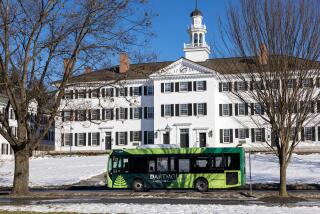His Exam RATs Out Lack of Practical Skill
- Share via
You aced the SAT and just won a full scholarship to your dream school. Or you just finished college summa cum laude and clinched a prestigious job with salary to match.
Done and diploma-ed, you are a graduate about to confidently make your way into the world.
You are so deluded.
Homer E. Moyer Jr. knows what you don’t: that you probably are far less prepared than you think. He’s an abundantly credentialed Washington, D.C., lawyer, but his workday title is secondary here. More significantly, he’s the father of four grown or nearly grown children and author of “The RAT.”
In this season of pomp and circumstance, the RAT--the Real-World Aptitude Test--could make you wonder if you’re truly ready to leave home.
Scored on the same 200 to 800 scale as the SAT, that often dreaded counterpart, Moyer’s exam focuses on information that helps a person maneuver through life skills and smarts that he characterizes as things worth knowing, things it would be risky not to know, things to give you an edge, and so on:
For example, what is the best way to dry a wool sweater?
Or, what has the highest concentration of alcohol--beer, grain alcohol, whiskey or wine?
Or, define the term compound interest and demonstrate how $100, earning 10% interest annually, would grow.
Or, sing (or recite) the first verse of “The Star-Spangled Banner.”
In all, the battery of questions covers 30 diverse and challenging subjects from domestic skills and electricity to gambling and the fine arts. But Moyer does more than give his test takers the Qs (in the form of multiple choice, true or false, fill-in-the-blank and even performance-related exercises requiring props like an iron or an egg). His 353-page paperback primer also provides the A’s, in great detail, with secondary sources and multiple Web sites to pique the curious. As a bonus, it’s suffused with humor.
“From the perspective of the test taker,” he writes in his introduction, “The RAT is vastly superior and far friendlier [than the SAT]. The RAT may be taken in the comfort of your own home; you make take as long as you like to finish; and, if you like, you can take it a second or third time without the answers having changed.
“Most important, the answers are in the back. And whatever your score, it will not be mailed in an official-looking envelope to employers or colleges with whom you may soon be interviewing--or colleagues who may have laughed at you in the past because you didn’t know how to change a tire.”
“The RAT,” which landed on store shelves in time for spring commencements, is not Moyer’s first book. His downtown Washington office contains previous titles such as “Export Controls” and “Justice & the Military,” weighty works reflecting his background as an international corporate attorney who has served as general counsel of the Commerce Department and founded an American Bar Assn. project on legal reform in former Communist countries. He started “The RAT” nearly eight years ago as a lighthearted gift for his daughter Bronwen, then a senior at Sidwell Friends School in Washington. As graduation approached, Moyer and his wife pondered how well their firstborn was going to fare away from the nest. The gift became a project that took on a life of its own as family and friends suggested fareas of inquiry. Chapters were dropped, chapters were added--by then, Bronwen was halfway through college and Max, child No. 2, was graduating from high school--and Moyer began testing the work in progress on various audiences.
Several more years and a few rejection letters later--by now, son Eli was in college and Kaia Joye, the youngest, in high school--Capital Books in Dulles, Va., agreed to publish “The RAT” and, potentially, a series of real-world aptitude tests.
“You could have a kitchen RAT, a new parents RAT, the travel RAT,” Moyer says.
For the moment, though, there is only one, selling for $19.95. At Moyer’s alma mater, Emory University in Atlanta, the alumni association is considering using “The RAT” in a non-credit class called “Life 101,” which is popular with seniors and recent graduates.
“We’ll either use it as a supplement or a text for the course,” says Bob Pennington, vice president for alumni affairs and development. Pennington, who counts an MBA and JD among his four degrees, has taken the RAT himself. “And I’m not about to tell you how I scored,” he says. However, he claims to have done better than Emory’s president, William M. Chase, who confessed to bombing the test in a note to Moyer.
“The premise obviously is Renaissance-like, in that it’s very eclectic and deliberately so,” Moyer says. “This is just another way to do what so many people do--to get prepared, to get ahead, to prepare for the bumps in the road, which we all have, and to make it fun.”
His personal favorites are the questions on automobiles, cooking and etiquette. “They seem to me to be among the most important practically. You step out the front door and you’re going to find you need to know something about all of them,” he says.
He’s discovered that young people are quite weak in the arts, strong on computers and abysmally ignorant of the Bible.
Lest young people try to turn the tables, he writes: “It is important to remember--and of special interest to parents--that one need not be able to pass the RAT to administer it. Its purpose, after all, is to edify the young, not mortify their elders.”
More to Read
Sign up for our Book Club newsletter
Get the latest news, events and more from the Los Angeles Times Book Club, and help us get L.A. reading and talking.
You may occasionally receive promotional content from the Los Angeles Times.










